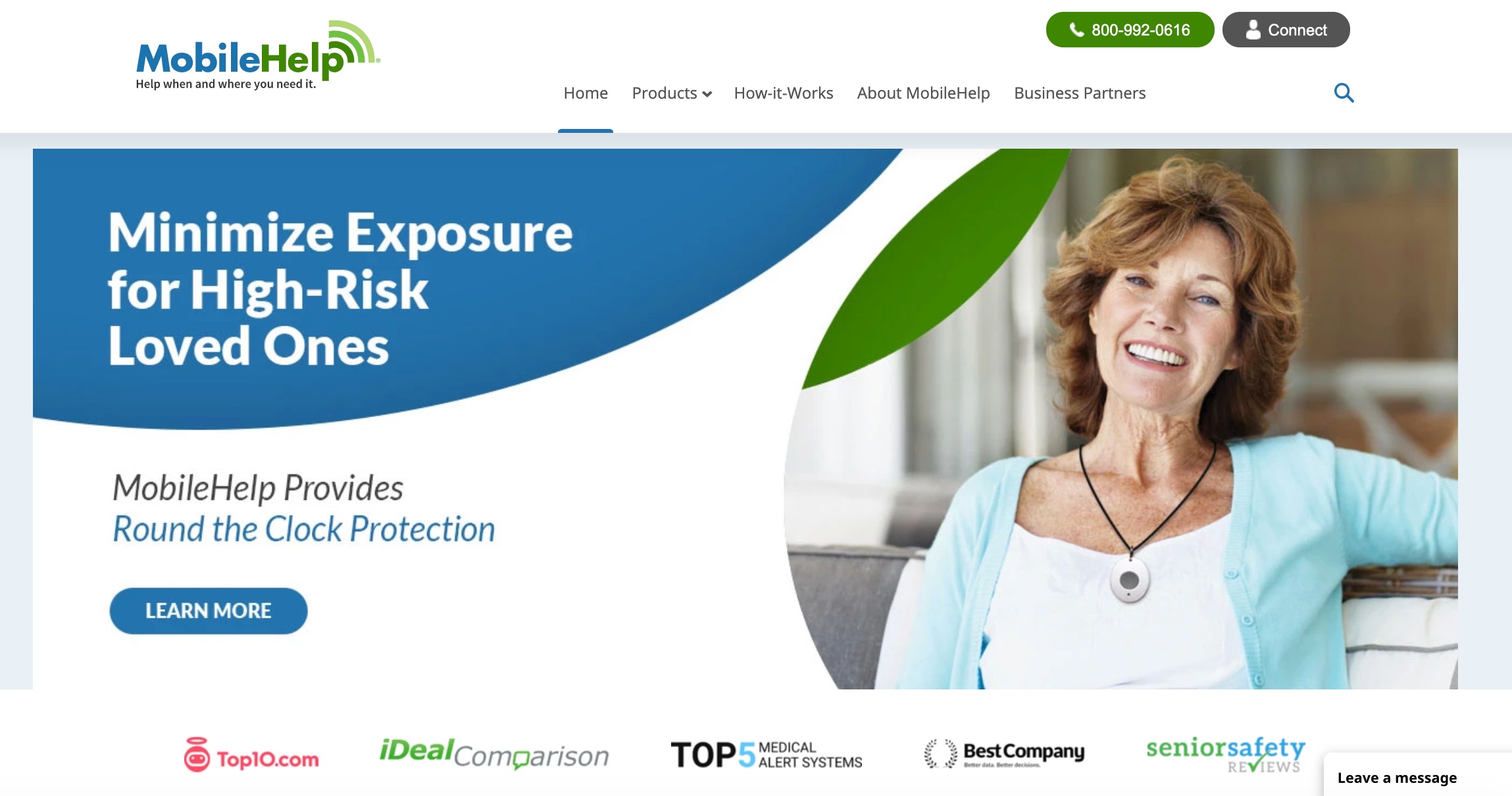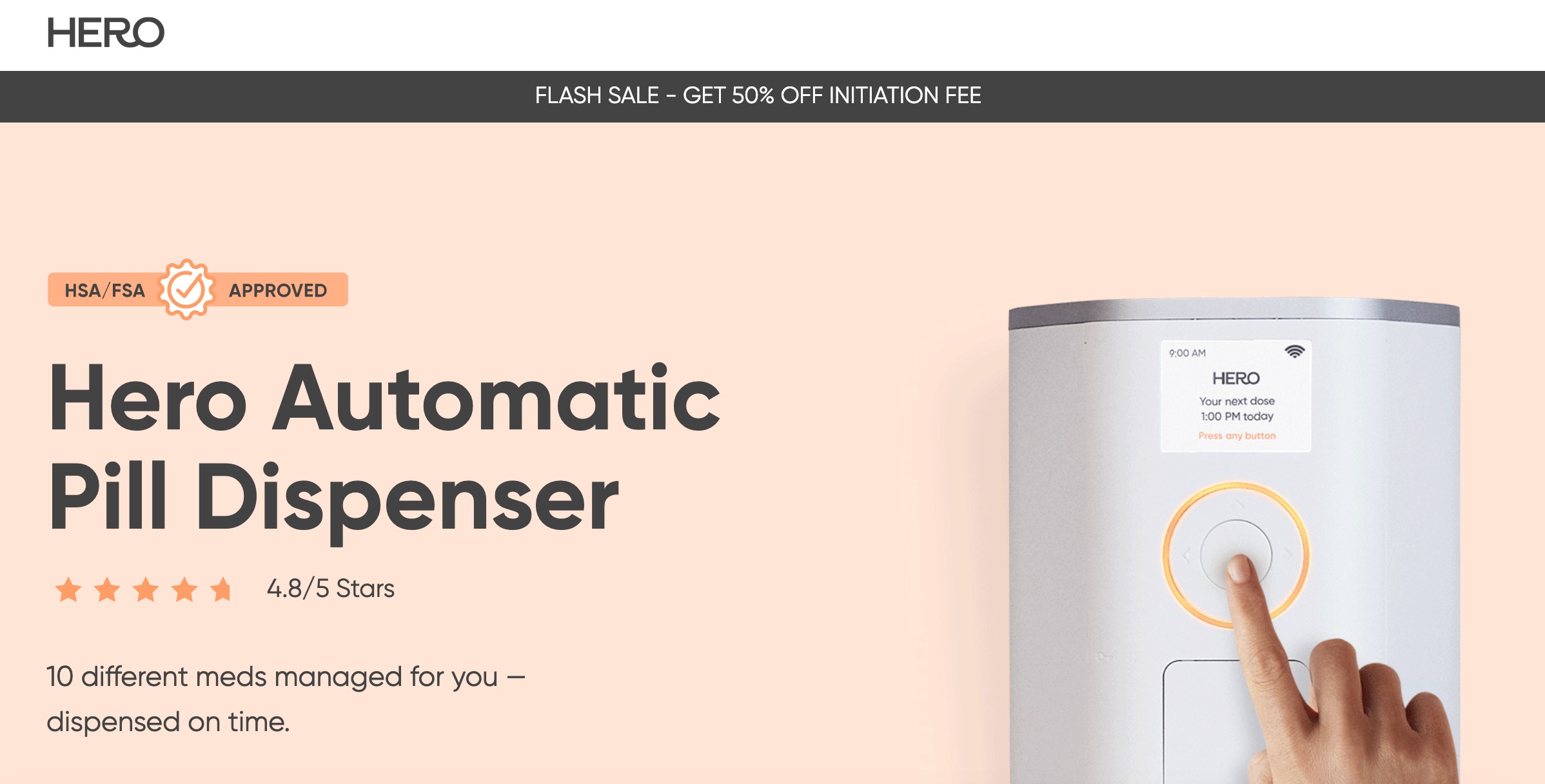Medical Alert Systems | MobileHelp 101 | MobileHelp Offers | Customer Reviews | Pros and Cons
Medical alert systems have been around for many decades, and the way they operate and are monitored has changed and advanced over time.
However, the general principle behind the invention remains the same: To help ensure the safety and well-being of the elderly in and out of the home.
Not only do these devices seek to ensure the safety of vulnerable members of the family, but they also help give other family members and caregivers peace of mind knowing their loved one has access to help if they need it.
Medical alert systems are becoming increasingly popular as more and more senior citizens are choosing to live independently in their own communities or homes.
Even though many seniors are more active than ever, the risks for falls and medical emergencies are still a real concern.
Thankfully, medical technology advancements have flooded the market with countless medical alert system options. Maybe not so thankfully, this has made actually choosing one a bit of an overwhelming task.
In a sea of options, MobileHelp is one medical alert system that stands out to us. It boasts thousands of strong customer reviews and is highlighted within many of the top senior care publications.
Our review seeks to take an honest look at this medical alert system option, providing you with the pros and cons to help you make the right decision.
The Need for Medical Alert Systems
Of course, we wish medical alert systems weren’t needed, but many of us are thankful that they exist. This technology has helped save thousands of lives.
The goal is simple: Get help to those who need it fast, when it is most needed.
Previous falls or increased fall risk are among the most common reasons people purchase medical alert systems.
Falls can pose serious health threats to living safely independently since the fall itself can lead to more serious injuries and medical emergencies.
According to data from the CDC, more than one out of four older people (65 and older) falls each year. Falling once doubles the chances of falling again.
One out of five falls causes serious injury like head injuries and hip fractures, and some folks unfortunately may never fully recover from the fall.
Protection and Independence
This sad reality has made many family members and caregivers take a serious look at home safety options for their elderly loved ones.
Medical alert systems provide an opportunity to bolster protection without compromising independence.
These types of systems can provide emergency monitoring and offer immediate access to assistance in the event of a fall or medical emergency.
Most are designed to signal emergency medical personnel through alarm monitoring systems.
Once the situation is assessed and it’s deemed immediate help is needed, emergency personnel can be dispatched and the family alerted in a matter of seconds.
With all of that in mind, let’s get into the specifics of what we like about MobileHelp, including what it has to offer as a medical alert system.
MobileHelp
MobileHelp is one of the top names in medical alert systems, being a leading provider of Mobile-Personal Emergency Response System (M-PERS) technology.
The company was established in 2008 and is based in Boca Raton, Florida. It serves customers in all 50 states within the U.S.
One unique aspect we discovered about MobileHelp is that it not only provides medical alert services directly to customers, but they also distribute their technology to other alert companies.
Being a leader in the industry definitely merits more consideration.
Their mission is a simple one: “Be someone’s hero, every day.”
How the MobileHelp Systems Work
We found the MobileHelp system to be pleasantly simple and straightforward — here’s how the process works during an emergency:
- The help button on the wearable pendant or remote portable emergency device is pressed.
- The user’s personal information and location are sent to the MobileHelp Response Center.
- MobileHelp’s personal response associate establishes two-way communication to assess the situation.
- If deemed an emergency, the associate will contact emergency services, family members, and caregivers.
Automatic fall detection offers extra protection if the button is unable to be pressed by the customer. This service is offered for an additional $10 a month (which is really a good deal, in our opinion, for the type of extra just-in-case protection it offers).
What Products Does MobileHelp Offer?
MobileHelp offers various product systems for use in the home or on the go.
MobileHelp Classic | In-Home
The Classic can be considered the basic in-home system, monitored 24/7. It includes a home base station and a wearable help button; which can be worn around the neck as a pendant or on the wrist.
Since it is waterproof, it can even be worn in the shower, where a lot of falls occur. The base station has a range of 1400 feet and a 30-hour battery backup.
Pricing: The Classic boasts a one-time fee of $49.95. The monthly plan costs $19.95. However, annual, semi-annual, and quarterly options are available to reduce costs, which is always a nice incentive.
Pro: This product is based on a cellular network; no landline is required.
Con: The only one we could really think of is that fall detection is not included in this plan — it costs an additional $10 a month.
MobileHelp Wired | In-Home
In our opinion, MobileHelp Wired is a great option for those who want an in-home medical alert system but do not want to use a cellular connection. Keep in mind, however, a landline is required for this option. It features a wearable help button neck pendant and has a 600-foot coverage area. Since it is tied into the landline, it features a built-in speaker for two-way communication.
Pricing: The monthly plan costs $24.95. Again, annual, semi-annual, and quarterly options are available to help save some money.
Pros: No upfront, one-time fee; great option for those with poor cellular reception at home.
Cons: Fall detection is not available with MobileHelp Wired; base station offers less range than the Classic; less mobility since it must be attached to a landline.
MobileHelp Touch Classic | In-Home
MobileHelp Touch offers a portable, all-in-one medical alert device option, a first in the industry. This tablet offers a basic home screen for use and easy-to-read applications from an 8-inch touchscreen. Options include in-home medication reminders and activity tracking. The help button is available as a pendant or wristband.
Pricing: The monthly plan costs $54.95. Annual, semi-annual, and quarterly options are available. Fall detection is available for an additional $11 a month.
Pros: WiFi and Bluetooth-enabled for max connectivity; features brain training games like Sudoku; has a nice rotating picture gallery.
Cons: Much more expensive than the other in-home options; battery life and range are greatly reduced.
MobileHelp Solo | On the Go
This system is completely portable, which makes it a great option for senior citizens that live active lives. It works entirely on a cellular network and is monitored wherever a cellular connection is available. There is no home base station. However, it does feature a mobile base station and a waterproof, wearable help button.
Pricing: MobileHelp Solo costs $37.95 for the monthly plan, but annual, semi-annual, and quarterly options are also available. Fall detection is available for an additional $11 a month.
Pros: Completely mobile, no landline required; features GPS location technology to help monitoring centers locate customers in case of emergencies.
Cons: Only compatible with the AT&T coverage network (with somewhat of a pro that AT&T offers some of the best coverage, even in rural areas); battery life is only 24 hours.
MobileHelp Duo | In-Home and On the Go
We find this product to offer the most complete system, providing both an in-home monitoring unit and a mobile unit for on the go. The waterproof help button connects with either unit. It truly has the most complete protection at 24 hours, 7 days a week, 365 days per year monitoring and response.
Pricing: MobileHelp Solo costs $41.95 for the monthly plan, but annual, semi-annual, and quarterly options are also an option to discount the cost. Again, fall detection is available for an additional $11 a month.
Pros: Complete with in-home monitoring unit and a mobile unit; features GPS location technology to help monitoring centers locate customers in case of emergencies.
Cons: GPS feature is only compatible on the AT&T coverage network; battery life is only 24 hours for a mobile unit.
What Do Customers Have To Say About MobileHelp?
All in all, customer reviews for MobileHelp are quite positive, albeit not perfect. Let’s take a look at a few.
I had this new service for only 2 days when I fell in a store. It automatically went off and dispatched the fire department. Thanks for being there for me…
— Delores, 5/5 stars on Review.io
All of the folks I spoke to (especially Donna ) were professional and helped me make my decision to have MobileHelp keep my loved one safe in case of an emergency. It was a simple, quick and seamless process on the phone and I also received the unit very quickly. Thank you.
— Martha, 5/5 stars on Review.io
Communication from your staff was excellent. When I did a test on my device it was very fast and I felt very good about it and it was extremely easy. I thank you all for a very good job.
— Carol, 5/5 stars on Review.io
How Does MobileHelp Compare to Life Alert?
Life Alert is another big name in medical alert systems. The overall goal of each brand is the same, but there are a few things to consider.
Life Alert costs quite a bit more in monthly monitoring, ranging from $49 to $68. Furthermore, Life Alert also requires a three-year contract for services — not good for those that don’t want to get locked in (i.e. pretty much everyone).
While they both have GPS-enabled features on some of their products, Life Alert does not offer fall detection.
With these main differences in mind, we personally think MobileHelp makes for a better option.
Plus, in terms of website navigation and overall functionality, MobileHelp wins hands down.
More Pros and Cons of MobileHelp
We’ve covered some of the pros and cons of the products that are offered, but let’s dig a little bit deeper.
MobileHelp Pros
MobileHelp Connect App. MobileHelp Connect is a web portal and mobile app that helps family members and caregivers monitor the safety of their loved ones. Its features offer location tracking, activity tracking, and system status alerts. Users can also sign up to receive event notifications if an alarm is triggered.
No contract to sign. Unlike other medical alert system companies, we have found that MobileHelp does not force users to sign a long-term contract — they can cancel anytime. Also, there are no hidden fees, which is always a breath of fresh air. Plus, MobileHelp is currently offering a 30-day risk-free trial.
Fall detection. We’ve mentioned it a ton but it is worth mentioning again because of how life-saving this feature is. Many falls are a result of fainting or other medical emergencies, so pressing the help button is not always an option. Again, this feature is an add-on option, but it seems more than worth it at just ten bucks a month.
MobileHelp Cons
Coverage can be hit or miss. Of course, coverage depends largely on your area. The GPS works off of satellite, but the cellular coverage for two-way communication could drop off depending on the area — remember, coverage maps aren’t always right.
Equipment replacement. If the device is defective or the battery is bad it can be replaced. However, outside of those possibilities, the equipment can be expensive to replace. MobileHelp does offer MobileHelp Connect Premium for $5 a month, which does cover device replacement for things like damage or accidents (though a small deductible may be required).
Lacks automatic tests. Monitoring systems test periodically. But, this system will not test automatically — testing of the monitoring system must be done manually.
Conclusion
Medical alert systems have been around since the 1970s, but as technology has advanced, their use has become more widespread and available to more people. Falls are a common occurrence among senior citizens, but medical alert systems give family members and caregivers peace of mind when their loved ones are alone.
MobileHelp’s expertise and product options provide something for all, offering both in-home and mobile options for active senior citizens and those with limited mobility.
Their pros, like their fall detection features and mobile monitoring app make them stand out. Their drawbacks are few in light of the competition.
At the end of the day, MobileHelp offers protection without sacrificing independence, making it what we believe, is a solid choice when it comes to medical alert systems.
References, Studies and Sources:
Medical Alert Systems | Monitoring Devices From MobileHelp
Important Facts about Falls | Home and Recreational Safety
Emergency Monitoring | MobileHelp
AT&T Maps – Wireless Coverage Map for Voice and Data Coverage from AT&T
LIFE ALERT® – HELP! I’ve fallen and I can’t get up!®
MobileHelp Connect Premium | MobileHelp
Owner, entrepreneur, and health enthusiast.
Chris is one of the Co-Founders of USARx.com. An entrepreneur at heart, Chris has been building and writing in consumer health for over 10 years. In addition to USARx.com, Chris and his Acme Health LLC Brand Team own and operate Pharmacists.org and the USA Rx Pharmacy Discount Card.
Chris has a CFA (Chartered Financial Analyst) designation and is a proud member of the American Medical Writer’s Association (AMWA), the International Society for Medical Publication Professionals (ISMPP), the National Association of Science Writers (NASW), the Council of Science Editors, the Author’s Guild, and the Editorial Freelance Association (EFA).
Our growing team of healthcare experts work everyday to create accurate and informative health content in addition to the keeping you up to date on the latest news and research.
How we built this article:
- Content Process
Every piece of content we produce is meticulously crafted and edited based on the four core pillars of our editorial philosophy: (1) building and sustaining trust; (2) upholding the highest journalistic standards; (3) prioritizing accuracy, empathy, and inclusivity; and (4) continuously monitoring and updating our content. These principles ensure that you consistently receive timely, evidence-based information.











